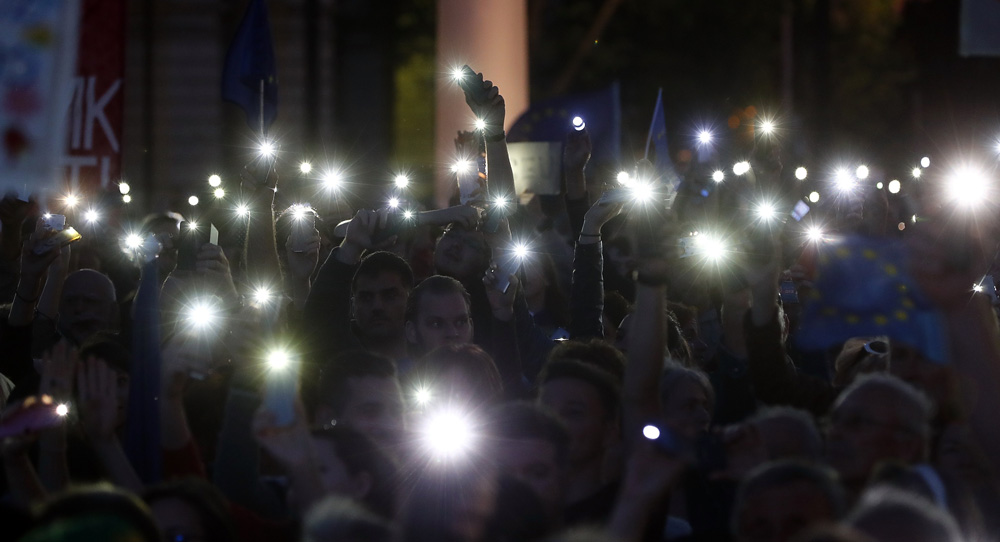The year 2019 is one of transition for the European Union: European Parliament elections take place in May, the top executive positions in the EU’s institutions are up for renewal in November or December, and the endless Brexit agony rumbles on. Amid these changes, and with the foreign policy domain crowded with emergencies, it would be easy to forget core democratic principles and let them be the first victims of pressing political constraints. Yet this is precisely why preserving EU rule-of-law principles matters more than ever before.
In the EU, maintaining democratic principles in all member countries is a challenging task. In different ways, with different words, national leaders in Italy and Hungary, and populist party leaders in France, Germany, and the UK, are openly challenging some of the key principles on which the EU is based. Academia, the judiciary, civil society, and the media are often the first victims of these populist views—not to forget the general public, which is offered simplistic and misleading narratives.
In this respect, the focus of this year’s European Parliament elections on national issues and on criticisms of Brussels hides the negative trend affecting rule-of-law principles in several EU members. Political parties are mostly arguing about jobs, the security of EU borders, and climate change. Rule-of-law considerations lag far behind, all the more so because they divide the European People’s Party, the right or center-right group in the European Parliament.On the foreign policy front, emergencies abound: the war in eastern Ukraine, Syria’s political settlement, Russian missiles in Turkey and their impact on NATO, counterterrorism cooperation in the Levant, and refugee flows—not to mention the first U.S. president in seventy years who professes adverse views about the EU. This state of play relegates the rule of law to a distant background in the list of priorities.
In addition, priority rankings differ from one country to another. Those EU countries with many nationals who have fought for the so-called Islamic State in Syria may prioritize counterterrorism; others are more preoccupied with a potential new wave of refugees from Syria’s northwestern Idlib province; and the risk of Turkey pivoting away from NATO and cozying up to Russia on missile defense is a momentous challenge for many.
The point is that attention to the rule of law is one and the same issue in EU domestic politics and foreign policy. The two cannot be dissociated, for several fundamental reasons.
First, rule-of-law principles are the cornerstones of the EU endeavor. They are rooted in the memory of two devastating intra-European wars and the European motto of “never again.” They have to do with the dignity of the European people, despite the passing of generations.
Second, whether Western European democrats like it or not, the EU model is being challenged by today’s Russia. Populist political parties in the West receive Russian funding, leaders of countries previously part of the Western world—such as Turkey, a NATO and Council of Europe member—are openly courted and offered alternative “deals,” while in countries that sit between the EU and Russia—such as Ukraine—insurgents receive military support. The Russian model may not yet be dominant, but it is on the ascent.
A third reason is the European export strategy of America’s brand of populism, through the activities of media executive and former White House chief strategist Steve Bannon, the man who claims to be responsible for U.S. President Donald Trump’s election victory. Unsurprisingly, these efforts are met with enthusiastic support from some European populist parties. After seventy years of unrelenting backing from the United States, the unexpected novelty is that Europe’s democracy is openly challenged from across the Atlantic, not just from its Eastern flank.
Finally, when a third country is for its own reasons massively degrading its rule-of-law architecture, remaining silent is not an option for the EU. Here, Turkey is a case in point. Ankara’s leadership may think that European trade and investment decisions should be made in isolation from issues of fundamental rights in Turkey. But EU countries are bound to take the exact opposite view—for the sake of Turkey’s democracy, for the sake of peace and stability in this important neighbor, and for the sake of their own interests in this large country.
After all, why should the EU disregard the fate of reformers and civil-society activists who passionately share the union’s democratic principles? Why should European industry invest tens of millions of euros in a country where the rule of the arbitrary has become more important than the rule of law?
Taken together, these reasons should prompt EU leaders to defend the rule of law both inside and outside their territory. There will be no benefit in keeping silent on Russian interference in eastern Ukraine, the abuses and war crimes of the Syrian regime, or the endless string of political trials in Turkey based on the country’s limitless definition of terrorism.
On the contrary, remaining silent on such abuses would reinforce the legitimacy of populist leaders in the EU. Even if the methods and narratives differ, and the situations are far from comparable, the risks for European democracies are serious when leaders start acting against academia, the media, the judiciary, and civil society. That applies both inside and outside the EU.
After the horse-trading for senior positions that will follow the European Parliament elections on May 23–26, when the political dust has settled, it will be high time for the new EU leadership and European heads of state and government to speak up for fundamental principles.







.jpg)